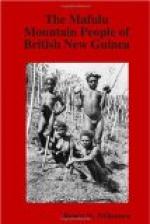2. The genitive is expressed by means of the possessive adjective.
Ex. ovo’u ma, hair of the pig, lit. pig his hair.
3. Persons belonging to a place sometimes omit the adjective.
Ex. A Kotsi, a man of Kotsi; An’Alol’, a man of Alole; Alol’ amu, a woman of Alole; Ambov’amu, a woman of Ambove; Tseluku ul’ akeda, men of Tseluku.
4. Position in a place, or motion to or from a place is shown in the following ways. When the noun has a shortened for _-tsi_ is suffixed. If there is no short form the final e of the noun is changed to i and _-tsi_ is added.
Ex. nani etsi ando, I am in the house; nuni bulitsi gatsi, thou wilt go to the garden; naga Mambutsi l’a tela, I have come here from Mambo.
Note (1). Some proper names of places do not take the suffix _-tsi._ Ex. amul’ Alol’ itatsi, the woman will sleep at Alole.
(2). Other proper names, especially those of mountains and the villages built on them, take the suffix _-tu_ (upon) instead of _-tsi._ Ex. Falitu gatsi, I will go to Faliba, lit. I will go upon Faliba.
IV. Interrogative Nouns.
The noun in Fuyuge has a special form to indicate the interrogative. If the noun ends in e, this vowel is changed to a. If already ending in a, the a takes a strong accent. To any other vowel ending a is added.
Ex. ovo(le) pig: interrog. ovola? is it a pig?
bulomakao, cow, &c.: interrog. bulomakaoa? is it a cow?
kuku, tobacco: interrog. kukua? is it tobacco?
kupa, sweet potato: interrog. kupa? is it a sweet potato?
V. Demonstrative Nouns.
These are similar to the Interrogative Nouns and are formed by the addition of the syllables _-aua, -ana,_ or _-ala_ instead of a. This form is both affirmative and interrogative.
Ex. oyand’ aua? is it a flower? or, it is a flower.
Tayov’ aua, it is Tayo; kuku aua, it is tobacco; an’ ala, it is a man; Ambov’ ana, it is Ambo.
Adjectives.
I. Adjectives have no Gender. In the expression of Case, Interrogative and Demonstrative forms they are the same as Nouns.
Ex. a baibe, amu baibe, man tall, woman tall; uli baibitsi mau, pot big-in put it, put it in the big pot; ifana? is it good? ifan’ ala, it is good.
II. Adjectives of Quality.
1. Number.
Number is expressed as with nouns by changing e to i. Some adjectives in _-a_ add i. There are no adjectives with the plural in _-a._ Some adjectives in _-a(ne)_ have the plural _-ai._
Ex. kakava(ne) strong, plur. kakavani; safa(le), plur. safa(li); isosonga, idle, plur. isosongai; aka(ne) small, plur. akai.




